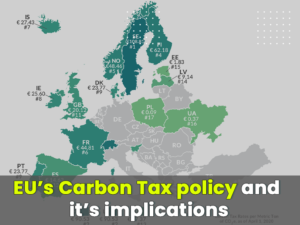
Global warming has been a serious concern for more than four decades now. With the Kyoto protocol guidelines, the entire world has now came together to arrest climate change by reducing GHG (greenhouse gases) emissions.
To attain net zero transmission, developed nations and developing nations have mutually agreed upon the pact to improve on multiple facets of productions and trade. In order to limit the emissions, the United Nations had decided to set a cap-and-trade policy for each industry that allows them to emit a specific amount of GHG and ‘buy’ carbon credits from those who are emitting lesser than the set standards. Consequently, developed nations like the member states of EU which have been amongst the pioneers in setting up a mechanism that encourage importers to either increase their production efficiencies or pay an extra ‘price’ by buying carbon credits for their emissions. This will increase the cost of the product and works as an added strategic resoultion for climate action as high price points of such products will reduce its consumption in the long run. EU recently announced its carbon tax policy and is planning to implement the penalty with effect 2026.
Developing nations are yet to follow the cap-and-trade policy for restricting carbon emission and hence they own the leverage to produce without any environmental risk. If importers can reduce their emissions by adopting green manufacturing solutions, consequently, imports from developing nations will cost much lesser than a product manufactured in EU.
Importing goods which have been produced from processes leading to higher emission leads to a phenomenon called carbon leakage. Carbon leakage will affect the potential of the domestic producers to sell in their own markets because of higher cost involved in buying carbon credits. Though the domestic producers in EU get some leeway in terms of free carbon limits as per the industry and production capacity, these limits fall short in comparison to the overall carbon emitted. EU is planning to levy carbon tax on imported products in order to provide an optimum level of competition.
Firms across the globe, especially in developing and developed countries will be most hit with the implementation of the new carbon tax by EU, as every firm strives to reduce its costs and increase its profitability but carbon tax will be an additional cost that they will have to cough up.
These curbs and mechanisms will improve the carbon efficiency slowly and steadily across the globe but shall have immediate impacts in demand and supply patterns. ESG (environmental, social and governance) goals will be met through these steps gradually but this may harm the economic growth of exporting countries in the short term.
Some of the key changes that are anticipated will be:
- Social:
- Incentive to manufacture domestically for EU manufacturers will go up
- Margins for exporters from developing/ developed countries will be hit. This will eventually impact economy and workforce of the concerned industries
- Domestic consumers will have to pay higher prices and this shall hit overall demand
- Environmental
- March to net zero globally will get a new boost
- Safeguarding biosphere, geosphere, hydrosphere and atmosphere will be more done than said
- Governance
- The march to net zero globally will now get a new boost
- Equitable grounds for competition among manufacturers
- Common trading platforms for both commodities and carbon credits can be set up leading to better transparency and higher incentives to entities that follow cap and trade limits
- Proportionate allocation of emission grounds for specific industries across the globe
- Technology
- Faster adoption of newer technology across geographies though faster and optimised technology transfer
- Better production facilities leading to more efficient production
- Political
- Balance of trade for a lot of developing countries shall be disturbed in the short term and this shall de stabilise the complex geo political balances in short run
Some of objectives of UN will also be attained with this move:
- Green transition: Investments will accelerate the decarbonization of all aspects of the economy
- Green jobs will increase leading to and sustainable and inclusive growth
- Green economy: It will make societies and people more resilient through a transition that is fair to all and leaves no one behind
- Invest in sustainable solutions: fossil fuel subsidies will end as polluters are made to pay for their emissions
- It will confront all climate risks and challenges
- Global cooperation – All countries will come together to fight the climate crisis
